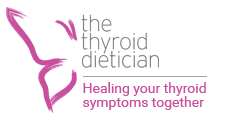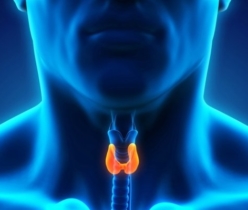* The following was contributed to the Live Well Podcast with Christina Tidwell, Holistic Registered Nurse and AIP Coach.
We’ve all been there.
You go to the doctor with complaints of sore muscles, headaches, feeling down, frustrated with the fact that the scale seems to only know how to go up, anxiety, you are not able to deal with stress, hair loss, feeling cold, etc. The list of symptoms seems endless. After you finish telling him or her your symptoms, the doctor runs a thyroid test.
“Well, your TSH looks just fine. There is absolutely nothing wrong with you. Must be just stress. I can prescribe you a light anti-anxiety medication to help you keep up with your lifestyle for now.”
You leave the doctor’s office feeling deflated and infuriated at the same time. You think to yourself, “How could nothing be wrong with me when I feel so low and exhausted? It MUST be my thyroid. There is no other explanation.”
The truth is, although science has caught up to understand what an optimal range for Thyroid Stimulating Hormone or TSH is (this is the standard test run to test thyroid function), most laboratories and doctors have not updated their knowledge on the subject. Add to this that a person cannot possibly be helped simply by looking at the ink on a piece of paper rather than the myriad of symptoms they complain of, you start to understand how our medical criteria fall short of treating a chronic condition such as hypothyroidism.
The good news is that there are tests you can go over with your doctor in order to understand if you truly have a thyroid issue.
Here is a run-down of the important tests you can request from your doctor:
TSH (Thyroid Stimulating Hormone) –
Although new standards were set by the American Association of Clinical Chemistry (AACC) in 2002, many labs have not updated their ranges to reflect those of healthy people. According to the AACC, the therapeutic target for thyroid replacement therapy is 0.5-2 mIU/L. A very different range from the old one that went to as high as 4.5 mIU/L.
Free T4 and Free T3 –
These are the main hormones that are made by the thyroid. T4 is the storage form of thyroid hormone and it is transformed to the active form of T3 (mainly in the liver). Optimal ranges of these thyroid hormones should be in the upper third of what is considered the normal range.
Reverse T3 –
Reverse T3 is produced when a person suffers from adrenal dysfunction, has too much stress, or has nutrient deficiencies such as low ferritin or B12 levels. When reverse T3 is high, this means that it is competing for the binding sites of the cell where free T3 naturally resides. When reverse T3 takes the place of free T3, it acts as a dud and does not allow free T3 to bind to the cell to do its job. This is known as thyroid resistance. In other words, you could be replacing thyroid hormones by using dessicated thyroid hormone (for example), but it has no effect because the cell has a reverse T3 molecule taking up the space where Free T3 should attach to. Optimal reverse T3 labs should be in the lower half of the normal range.
Reverse T3 to Free T3 ratio-
Reverse T3 is only useful when compared to Free T3. In other words, reverse T3 could be in the normal range, however, in comparison to Free T3, there could be way too much. An ideal Reverse T3 to Free T3 ratio should be greater than 20 pmol/L.
TPO and Thyroglobulin Antibodies –
Over 95 percent of hypothyroidism cases are autoimmune in nature and higher than normal antibodies could be present within the body 15 years before the thyroid could actually start to falter. Therefore, it would be silly not to check these antibody levels. If you have TPO or Thyroglobulin antibodies higher than 2 IU/ml, this can be indicative of an autoimmune condition.
Ultrasound –
This is another tool that can be used in conjunction with labwork in order to better conclude that there is an autoimmune condition present. A skilled doctor can understand if Hashimoto’s is present or not with the use of the ultrasound.
Don’t Forget The Root Cause!
As thyroid disease could have its root cause in many different areas of the body, it would be prudent to seek the advice of a functional medicine doctor in order to assess if the gut is working optimally, if there is an underlying viral, bacterial, or parasitic infection, if there are any nutrient deficiencies (such as vitamin D, iron, ferritin, vitamin b12, magnesium, selenium, zinc, and tyrosine-the common deficiencies of hypothyroidism), if there is a toxicity issue going on, or if there is adrenal dysfunction. All of these functional tests could help the doctor and the patient to get a better understanding of what is the root cause of the thyroid condition.
The lesson here?
If you have an entire list of symptoms that seem to hint towards a thyroid issue, make sure to find a doctor that is willing to run and go through all of the above tests with you. It could mean the difference between health and dis-ease.




